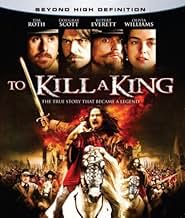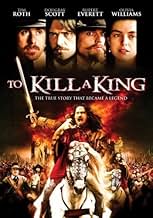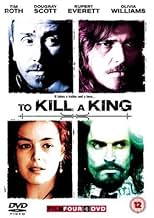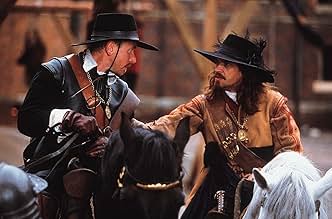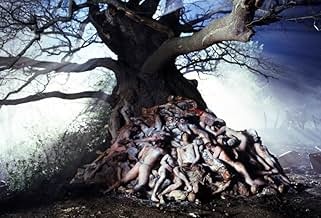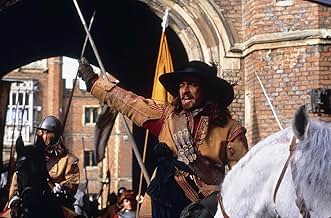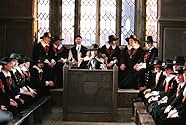PUNTUACIÓN EN IMDb
6,2/10
3,5 mil
TU PUNTUACIÓN
Añade un argumento en tu idiomaA recounting of the relationship between General Fairfax and Oliver Cromwell, as they try to cope with the consequences of deposing King Charles I.A recounting of the relationship between General Fairfax and Oliver Cromwell, as they try to cope with the consequences of deposing King Charles I.A recounting of the relationship between General Fairfax and Oliver Cromwell, as they try to cope with the consequences of deposing King Charles I.
- Nominado a 1 premio BAFTA
- 3 nominaciones en total
Reseñas destacadas
To Kill a King is directed by Mike Barker and written by Jenny Mayhew. It stars Tim Roth, Dougray Scott, Olivia Williams, James Bolam and Rupert Everett. Music is by Richard G Mitchell and cinematography by Eigil Bryld.
It's the end of the English Civil War and with King Charles 1st (Everett) held prisoner by the Parliamentarians, Sir Thomas Fairfax (Scott) and Oliver Cromwell (Roth), friends and colleagues, fall out over the best plan of action for the New England.
A severely troubled production and budgetary constraints left To Kill a King with a mountain to climb just to get acknowledged as a historical epic of worth. Add in the dubious take on this part of English history that so irked the historians, and you would be forgiven for thinking that the film is something of a stinker. Not so actually. For although it's clearly far from flawless, it's a literary piece of work that chooses character dynamics over blood and thunder. Suffice to say that those searching for a battle strewn epic should look elsewhere, but if you have a bent for observations on key personalities involved in war politics during times of upheaval in a period setting? Then this delivers the goods. Well performed by the principal players as well. 7/10
It's the end of the English Civil War and with King Charles 1st (Everett) held prisoner by the Parliamentarians, Sir Thomas Fairfax (Scott) and Oliver Cromwell (Roth), friends and colleagues, fall out over the best plan of action for the New England.
A severely troubled production and budgetary constraints left To Kill a King with a mountain to climb just to get acknowledged as a historical epic of worth. Add in the dubious take on this part of English history that so irked the historians, and you would be forgiven for thinking that the film is something of a stinker. Not so actually. For although it's clearly far from flawless, it's a literary piece of work that chooses character dynamics over blood and thunder. Suffice to say that those searching for a battle strewn epic should look elsewhere, but if you have a bent for observations on key personalities involved in war politics during times of upheaval in a period setting? Then this delivers the goods. Well performed by the principal players as well. 7/10
We Americans are pretty bad at knowing our own history let alone that of other countries. As a retired World History teacher, I know that very, very few of us know about the English Civil War of the 17th century. Who fought on each side and what they were fighting over is not something most Americans would know. I know--but considering my job, that's no surprise! So, unless you are really up on English history as well as the lives of Oliver Cromwell and Charles I, you might just want to read up on it before you watch "To Kill a King". Also, you might want to read a few different sources, as most British authors I've read seem to think killing the king was a bad thing--whereas non-Brits probably are more willing to concede that this was pretty cool (particularly American or Marxist historians--who, for once, would agree with each other).
So, I'll give you a bit of background. This story is about the latter portion of the Civil War. Many years have passed and the armies of the Parliament and the King's have fought many battles against each other. Each time the King's forces have been vanquished, he makes promises to make reforms. And, once the armies went home, the King simply ignored these reforms--and the war began anew. The main problem, as I see it, is that the King believed he was an absolute monarch and the Parliament was standing firm on their traditional rights--such as the right to tax (which the King repeatedly ignored). Now, with few remaining friends of his own, the King takes a 'divide and conquer' strategy. In other words, divide the members of Parliament by promising various rewards and bribes. He also escaped custody and threatened to raise yet another army to begin the war again. Now, in light of all this, the leaders of the insurrection now see a need to end it...by killing their king. The army's leader, Fairfax, is reticent--and the man who is one of the powerhouses in Parliament, Cromwell, sees the execution as inevitable. While the film is about this divide and conquer scheme and the eventual trial of the King, it is difficult to understand all that led up to this--a weakness in the film that might have been dealt with by using a prologue or stretching out the film a bit longer.
For history teachers and folks in the know, "To Kill a King" is good stuff--well acted and produced (even if the army of the Parliament only seems to have been made up of about 50 guys in this film!). Otherwise, it does seem to be lacking context which would make it easier to follow--as well as very low energy despite the theme.
So, I'll give you a bit of background. This story is about the latter portion of the Civil War. Many years have passed and the armies of the Parliament and the King's have fought many battles against each other. Each time the King's forces have been vanquished, he makes promises to make reforms. And, once the armies went home, the King simply ignored these reforms--and the war began anew. The main problem, as I see it, is that the King believed he was an absolute monarch and the Parliament was standing firm on their traditional rights--such as the right to tax (which the King repeatedly ignored). Now, with few remaining friends of his own, the King takes a 'divide and conquer' strategy. In other words, divide the members of Parliament by promising various rewards and bribes. He also escaped custody and threatened to raise yet another army to begin the war again. Now, in light of all this, the leaders of the insurrection now see a need to end it...by killing their king. The army's leader, Fairfax, is reticent--and the man who is one of the powerhouses in Parliament, Cromwell, sees the execution as inevitable. While the film is about this divide and conquer scheme and the eventual trial of the King, it is difficult to understand all that led up to this--a weakness in the film that might have been dealt with by using a prologue or stretching out the film a bit longer.
For history teachers and folks in the know, "To Kill a King" is good stuff--well acted and produced (even if the army of the Parliament only seems to have been made up of about 50 guys in this film!). Otherwise, it does seem to be lacking context which would make it easier to follow--as well as very low energy despite the theme.
STAR RATING:*****Unmissable****Very Good***Okay **You Could Go Out For A Meal Instead*Avoid At All Costs
As a kid,I used to love learning all about the Tudors and Stewarts,especially about monarchs such as Henry the Eighth (sorry,I'm terrible at my Roman numerals),Edward the First (the youngest ever monarch) and Charles the first who was beheaded.So when I saw a film trailer promoting a new film about Charles and his conflict with Oliver Cromwell,who became head of the Roundheads,Charles's greatest adversaries,I felt inclined to go and see it as soon as possible.
The results were admirable,though not great.It boasts a fine central cast,in the shape of Tim Roth as Cromwell,Dougray Scott as his aide Thomas Fairfax,James Bolam as roguish parliamentary speaker Holles and Rupert Everitt as the ill-fated king himself.They all play their parts with dash and spirit,which can only be a good thing.And there's some fine photography and lavish costume design to add to the recommendations.
On the down side however,Mike Barker's direction becomes a little meandering and laboured and there are some fairly huge historical inaccuracies in the telling of the tale.
Still,everyone involved looks like they're enjoying starring in it,as indeed any 'actor' probably would,as this sort of period piece is how many such exhibitionists learn the art of fine drama.Just get yourself in the right mood,mosey on out,and I'm sure you might enjoy watching them perform it just as much.Or almost.***
As a kid,I used to love learning all about the Tudors and Stewarts,especially about monarchs such as Henry the Eighth (sorry,I'm terrible at my Roman numerals),Edward the First (the youngest ever monarch) and Charles the first who was beheaded.So when I saw a film trailer promoting a new film about Charles and his conflict with Oliver Cromwell,who became head of the Roundheads,Charles's greatest adversaries,I felt inclined to go and see it as soon as possible.
The results were admirable,though not great.It boasts a fine central cast,in the shape of Tim Roth as Cromwell,Dougray Scott as his aide Thomas Fairfax,James Bolam as roguish parliamentary speaker Holles and Rupert Everitt as the ill-fated king himself.They all play their parts with dash and spirit,which can only be a good thing.And there's some fine photography and lavish costume design to add to the recommendations.
On the down side however,Mike Barker's direction becomes a little meandering and laboured and there are some fairly huge historical inaccuracies in the telling of the tale.
Still,everyone involved looks like they're enjoying starring in it,as indeed any 'actor' probably would,as this sort of period piece is how many such exhibitionists learn the art of fine drama.Just get yourself in the right mood,mosey on out,and I'm sure you might enjoy watching them perform it just as much.Or almost.***
My reaction to this movie was similar to my reaction to "Elizabeth: The Golden Age." A lot of attention was paid to casting and period costuming and location. However, budget constrictions apparently were such that the story could not be told on a greater scale. For example, the movie begins with the mopping up after Cromwell's army has defeated the royalist forces. But unless you are well versed in English history, you don't know why or how they were fighting. (Like the Roman Legions, Cromwell's--or Fairfax's--army had a distinct organizational, tactical and weapon advantage over their opponents.) Gradually the differences in philosophy of governing is portrayed and we begin to get some idea of why everyone hated Charles I, although we really don't see much from a commoner's perspective. The reason for the close relationship of Lady Fairfax to the King and to Cromwell is never made clear (at least not to me). If you have to tell this story with limited locations, then it's better done as a mini-series, where the historical reasons for the conflict can better be elaborated. If you're going to make a movie, at least show us some battle scenes and better explain the motives for everyone's actions.
I was quite excited to see this being a fan of historical films and particularly interested in the Tudor and Stuart periods. The front of the video is presented in exactly the same style as Elizabeth which I thoroughly enjoyed. Elizabeth is relatively well researched and despite some poetic license depicts the early reign well. So this coupled with the acting prowess of Rupert Everett and Tim Roth all boded well. But what a pile of poopie. Over simplified, dreadfully inaccurate, - the list goes on = one of the most interesting periods of English History turned in to a bad Soap Opera. A significant part of the story is Fairfaxes refusal to sign Charles's death warrant. Well ladies and gentlemen in fact he was one of the first to sign. Suffice it to say the lines at the end "And England never again became a republic" (lol) sums up this little piece of filmery.
¿Sabías que...?
- CuriosidadesThe films turbulent production was constantly beset with financial problems & funding went bankrupt twice during filming. the film was only barely completed & eventually released through private investment.
- PifiasIn the opening sequence, Fairfax shoots the sword out of the hand of Cromwell's assassin with a flintlock pistol at about 30 yards range. Such pistols had no rifling at that period and were incapable of nowhere near such accuracy, even in the hands of an expert. To shoot at that range Fairfax would have been more likely to have hit the assassin. Also the bullet struck sparks from the sword hilt when it hit. This is impossible as the bullet would have been a soft lead ball and incapable of creating a spark.
- Citas
Denzil Holles: At last we all can sleep soundly, knowing that for once the King cannot impose a new tax on us in the morning.
Sir Thomas Fairfax: You make it sound as if you fought the war only to save your profits, Holles!
Selecciones populares
Inicia sesión para calificar y añadir a tu lista para recibir recomendaciones personalizadas
- How long is To Kill a King?Con tecnología de Alexa
Detalles
- Fecha de lanzamiento
- Países de origen
- Idioma
- Títulos en diferentes países
- To Kill a King
- Localizaciones del rodaje
- Empresas productoras
- Ver más compañías en los créditos en IMDbPro
Taquilla
- Presupuesto
- 14.300.000 US$ (estimación)
- Recaudación en todo el mundo
- 567.471 US$
- Duración1 hora 42 minutos
- Color
- Mezcla de sonido
- Relación de aspecto
- 2.35 : 1
Contribuir a esta página
Sugerir un cambio o añadir el contenido que falta

Principal laguna de datos
By what name was Matar a un rey (2003) officially released in India in English?
Responde

